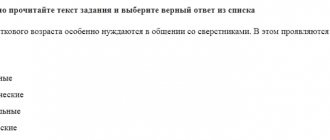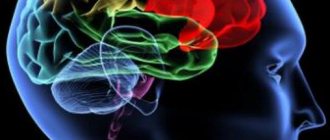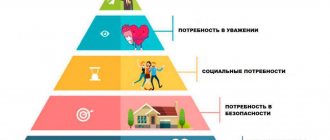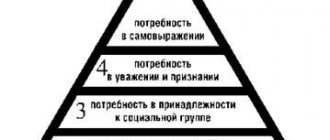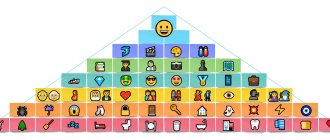Human needs and abilities
Need is a state of a person created by the need he feels for objects and actions necessary for his existence and development and serving as a source of his activity, organizing cognitive processes, imagination and behavior. Groups of needs: biological: needs for food, sleep, air, warmth, etc. social, which are generated by society and are necessary for a person to interact with other people. spiritual: needs for knowledge of the surrounding world and the person himself. The needs of each person at the next level become urgent when the previous ones are satisfied.
The ability to satisfy needs is related to a person’s abilities. Levels of human abilities: Inclinations are anatomical and physiological characteristics of the body, mainly the central nervous system, which are biological prerequisites for the development of abilities. Abilities are individual characteristics of a person, which are subjective conditions for the successful implementation of a certain type of activity.
Talent is a high level of development of abilities. The highest degree of creative manifestation of personality is genius .
At the everyday level, need is what a person wants, and ability is what he can.
Need is a constant internal stimulant of a person to action, that is, to activity.
Instinct and need. Their types and relationships
The basis of any human need is a corresponding innate instinct.
Instinct is a biological, that is, a natural factor inherent in an individual as a living being.
Instincts can be divided into three groups:
1. Vital (Latin – life), that is, ensuring the vital functions of the body (food, reproduction, etc.);
2. Social – the need for relationships between individuals;
3. Intellectual – the need to understand the world around us. (orienting instinct)
needs can be divided into similar groups:
1. Biological – the need for everything that ensures life;
2. Social - the need for work, self-realization, self-affirmation - in a word, for what follows from human relationships.
3. Spiritual – needs for knowledge, knowledge, culture...
Abraham Maslow's pyramid of needs
As you know, science does not stand still, but develops on the basis of what is already known.
All needs are divided into 2 groups: primary and secondary.
Primary (basic, main) – congenital. These include:
1. Physiological needs (examples above)
2. Existential (English – to exist) – comfort, confidence in the future, guarantees of security...
Secondary – acquired. These include:
1. Social needs - communication with people, joint activities...
2. Prestigious needs - self-esteem, achieving success, career, self-respect by others...
3. Spiritual needs - self-expression.
According to Maslow, the needs of each next level can only be satisfied when the previous level is reached.
Imaginary and real needs
You can also distinguish between genuine and imaginary needs.
Genuine needs are those that lead to personal development.
Imaginary or false - on the contrary, lead to degradation.
- imaginary needs are, for example: the need for smoking, alcohol. — satisfaction of genuine needs encourages a person to lead an active life, contributes to his self-improvement without causing damage to other people or nature. — satisfaction of imaginary needs leads to physical and spiritual degradation of the individual, causing damage to nature and society. Interest and need: similarities and differences
You also need to understand that in life the concepts of interest and need are often confused. It is not the same.
Interest is a conscious need, characterized by people’s attitude towards objects or phenomena of reality that have important social significance.
The basis of interest is the understanding of the need to take some action to achieve a goal. That is, this is a conscious need. BUT!
A person’s interest is directed not at the immediate object of need, but at those social conditions that make this object accessible. Difficult, right? Example: a person decided to use the presidential plane as a passenger. This has become a conscious need. But to do this he must become president, and his interest is in running for that office. And as soon as he becomes president, he will immediately become a passenger on Air Force One.
Classification of interests
Interests depend on a person’s position in society, on his membership in a particular social group. Hence,
Interests vary:
- by degree of community (individual, group, public);
- by area of focus (economic, spiritual, social, political...);
- according to the degree of awareness (spontaneous or created on the basis of a developed program of activities);
- according to the possibilities of implementation (real and imaginary).
Human activity is unthinkable without the possibility of its implementation. These capabilities are called abilities.
Capabilities
Ability is an individual characteristic of a person, on which the success of the activity he performs depends.
It is worth keeping in mind that ability is not just the ability to do something well, but also how quickly, how completely, how firmly (in terms of duration) something is done.
People have been interested in abilities and their origin since ancient times. Then they were interpreted as special properties of the soul inherent in a person initially, from birth. In the Age of Enlightenment, the trend went towards the fact that abilities are completely dependent on the external conditions of a person’s life. That is, a person is born without abilities, and they are created in the process of life (the principle of tabula rasa - “blank slate”).
The modern approach is in the middle. Abilities are now considered as a synthesis of the biological and social in man.
Simply put, abilities are laid down genetically (there are genetic programs of behavior encoded in DNA molecules), but develop only in the process of life.
In other words, it is not the ability itself that is genetically determined, but the ability to have the ability. If this ability is not developed, then nothing will manifest itself.
Therefore, the development of any ability depends on many social factors.
The criterion for the typology of abilities is usually various types of activities - science, music, art. And abilities are distinguished - artistic, musical, engineering, literary, etc.
In addition, within the framework of psychology, general abilities are identified that are responsible for success in various types of activities. (that is, if a student has mathematical abilities, for example, he successfully studies mathematics, history, physics, biology...)
Talent and genius
As the middle and extreme options for the development of abilities, talent and genius are distinguished.
Talent is a set of abilities that allows you to create something of excellence, but within the framework of existing knowledge or skills.
Genius is a combination of abilities or an ability that allows you to create something fundamentally new, something that has never before been analogous.
| Social needs |
| Value-oriented needs The basis for identifying this group of needs is the classification of needs according to the criteria of their humanistic and ethical orientation, according to their role in the lifestyle and comprehensive harmonious development of the individual. Based on these criteria, one can distinguish between reasonable and unreasonable (perverted) needs, true and false, progressive and destructive needs. Let's consider reasonable and unreasonable needs. Reasonable needs are needs, the satisfaction of which contributes to the normal functioning of the human body, the growth of the prestige of the individual in society, its humane development, and the humanization of all aspects of social life. The following criteria for reasonable needs can be distinguished: 1. A sense of proportion in satisfying needs, without leading to personality degradation. 2. Harmonious combination of different needs. Even a spiritual need cannot be recognized as reasonable if its satisfaction is achieved through the suppression of other (natural and material) needs. 3. Correspondence of needs to the abilities of the individual and the availability of means for their implementation. 4. Manageability of needs. Reasonable needs can be called those needs that are controlled by a person, and not vice versa, when needs control a person. Unreasonable needs are a group of needs that create dead-end situations in the functioning of the human body, in the development of the individual, harm the interests of society, and if they are misaligned, lead to the degradation of human society and the dehumanization of all social relations. The range of irrational needs is extremely wide: from smoking to narcotic acupuncture. The 18th century French socialist Gabriel Mably wrote about a person’s ability to distinguish between reasonable and unreasonable needs and the role of this ability in the formation of a reasonable lifestyle and, ultimately, a person’s happiness: “Useless (unreasonable) needs evoke in a person desires that are useless for his true happiness and fill his most unjust and absurd prejudices or errors." I call perverted (harmful) those unreasonable needs that, if satisfied, lead not only to the destruction and cynical violation of the moral and legal norms of human society, but also, in their extreme manifestations, contribute to the degradation of human nature and a dead end in the development of the “human” race. This is an excessive need for alcohol, drugs, homosexuality and lesbianism, and some plastic surgeries. These vices of modern society exist not so much from a lack of material goods, but from satiety with material goods and the lack of spirituality of man, the lack of ideals in people for which to fight. |
Need Development
Any need develops in two stages:
- It appears as an internal, hidden condition for activity, acts as an ideal. A person compares knowledge about the ideal and the real world, that is, he looks for ways to achieve it.
- The need is concretized and objectified, and is the driving force of activity. For example, a person may first recognize the need for love and then look for the object of love.
Needs give rise to motives, against which the goal emerges. The choice of means to achieve a goal (need) depends on a person’s value orientations. Needs and motives shape the orientation of the individual.
Basic needs are formed by the age of 18-20 and do not undergo significant changes in the future. The exception is crisis situations.
Sometimes the system of needs and motives develops disharmoniously, which leads to mental disorders and personality dysfunction.
Creative activity
A special type of activity is creativity - the process of creating something qualitatively new, never existing before. Artists, writers, and scientists are engaged in creative activities.
Creativity can also be considered as a component of other activities. So, our applicant from the example above can be creative in the process of preparing a resume and come up with a completely new approach that will captivate the employer.
The key abilities for creative activity are:
- combine existing knowledge;
- create new images in the mind (imagination);
- create vivid, strong ideas (fantasy);
- gain knowledge unconsciously (intuition).
We will help you consolidate new material in social studies lessons at the Skysmart online school.
Classification of activities
In social science, there is more than one classification of activity, but we will consider the most popular one - according to objects and results of activity.
Depending on what the result is - material wealth or cultural values - activity can be material (practical) and spiritual.
Material activity involves the creation of things and material values that are needed to satisfy human material needs. It is divided into material-production , associated with the transformation of the surrounding nature, and social-transformative , aimed at transforming society.
Products of spiritual activity - ideas, images, scientific, artistic and moral values. Spiritual activity is:
- cognitive - related to the reflection of the surrounding world in mythological, religious, scientific or artistic form;
- value-oriented - expressing a person’s attitude to the phenomena of the surrounding world;
- prognostic - involved in forecasting possible changes in reality.


